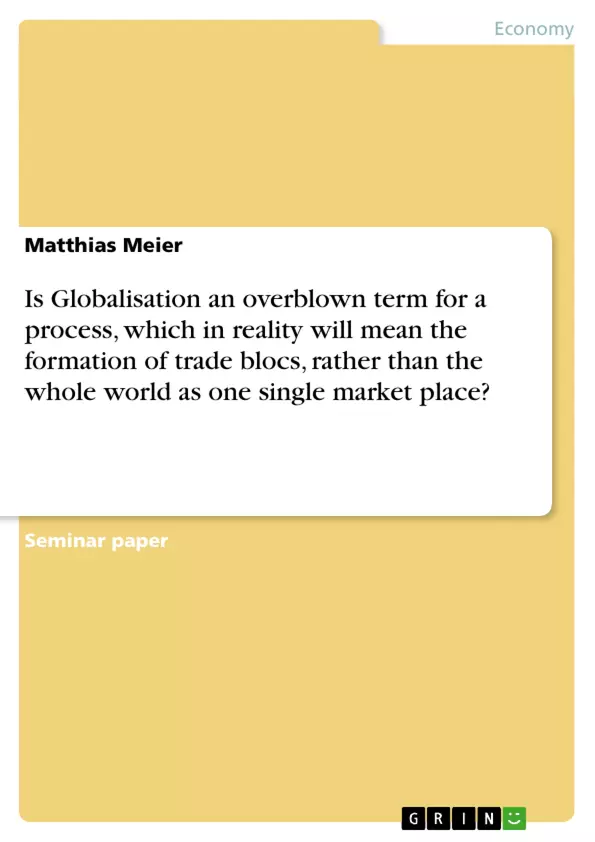Today everybody talks about globalisation and while some people are looking forward to a globalised and fully integrated world some critics argue that this process leads to a world where the rich become richer and the poor even become poorer. But does globalisation really take place? More and more nations engage in a process called regionalisation. Regional agreements have never been so popular as today and the number of trade blocs increases. Today approximately 170 regional agreements exist and half of them have been established since 1990 (Moore, 2000). Most of the WTO members are at least part in one of them and 50% of worldwide trade occurs between countries belonging to regional agreements (Ruggiero, 2003). Even the WTO as an institution with the objective to foster world trade and to abolish measures that inhibit trade, is increasingly concerned about regionalisation and the growing number of trade blocs which have the potential to circumvent and undermine the aim of the WTO by offering privileges to its members and discriminating non-members (Au and Chan, n.d.). Mike Moore (2000), former WTO Director General puts it as follows: “Is there a risk that regionalism is becoming a stumbling-block, more than a building block, for the new WTO? Draining energy from multilateral negotiations? Fragmenting international trade? And creating a new international disorder characterized by growing rivalries and marginalization and the possibility of hostile blocs?” (Moore, 2000). Hirst and Thompson (1996) argue that globalisation is an overblown term for a process which in reality will mean the formation of trade blocs, rather than the whole world as one single market place.
This essay critically evaluates this argument by considering the pros and cons of the question whether trade blocs replace the concept of globalisation and the world as one single market place. This question will be answered with the help of bifocal perspectives. The second Chapter considers a micro-perspective by evaluating whether companies become increasingly footloose and transnational or whether companies retain a home base with significant sales in their home region or trade bloc. The third Chapter has a more general perspective and assesses the importance of trade blocs and its impact on inter- and intra-trade.
Inhaltsverzeichnis (Table of Contents)
- Introduction
- Triad-based multinational corporations or global transnational corporations?
- Do trade blocs derogate global trade and reduce globalisation?
- Conclusion
Zielsetzung und Themenschwerpunkte (Objectives and Key Themes)
This essay critically evaluates the argument that trade blocs replace the concept of globalization and the world as one single marketplace. It explores the pros and cons of this assertion through two perspectives: the micro-perspective of companies' transnationalization and the macro-perspective of trade blocs' impact on trade.
- The rise of regional trade blocs and their potential impact on global trade
- The transformation of multinational corporations (MNCs) into transnational corporations (TNCs) and the role of FDI
- The influence of trade blocs on inter- and intra-trade flows
- The economic ideal types of a fully globalized economy and an open international economy
- The significance of national home bases for companies and their relationship to global operations
Zusammenfassung der Kapitel (Chapter Summaries)
- Introduction: The essay introduces the topic of globalization and regionalization, highlighting the growing importance of trade blocs and the debate surrounding their potential impact on global trade. It also outlines the essay's objectives and perspectives.
- Triad-based multinational corporations or global transnational corporations?: This chapter explores the two economic ideal types of a fully globalized economy and an open international economy. It examines the potential transformation of MNCs into TNCs and the implications of companies becoming stateless and operating on a global scale. The chapter considers contrasting perspectives from Ohmae and Hirst and Thompson regarding FDI and the importance of national home bases.
Schlüsselwörter (Keywords)
The primary keywords and focus topics include globalization, regionalization, trade blocs, multinational corporations (MNCs), transnational corporations (TNCs), foreign direct investment (FDI), inter- and intra-trade, national home base, economic ideal types, and the Triad.
Frequently Asked Questions
Is globalization being replaced by regional trade blocs?
The essay evaluates whether the rise of approximately 170 regional agreements suggests that the world is forming hostile trade blocs rather than a single marketplace.
What is the difference between an MNC and a TNC?
A Multinational Corporation (MNC) usually retains a strong national home base, while a Transnational Corporation (TNC) is seen as "stateless" and operates globally without a primary national identity.
How do trade blocs impact global trade according to the WTO?
There is a risk that regionalism becomes a "stumbling block" by draining energy from multilateral negotiations and discriminating against non-members.
What are the "Triad" markets?
The Triad refers to the three dominant economic regions: North America, Western Europe, and East Asia (Japan), where most multinational corporations focus their activities.
What is the "micro-perspective" on globalization in this essay?
It examines whether companies are truly "footloose" or if they still rely on significant sales and operations within their home region or trade bloc.
- Arbeit zitieren
- Matthias Meier (Autor:in), 2006, Is Globalisation an overblown term for a process, which in reality will mean the formation of trade blocs, rather than the whole world as one single market place?, München, GRIN Verlag, https://www.grin.com/document/77813



